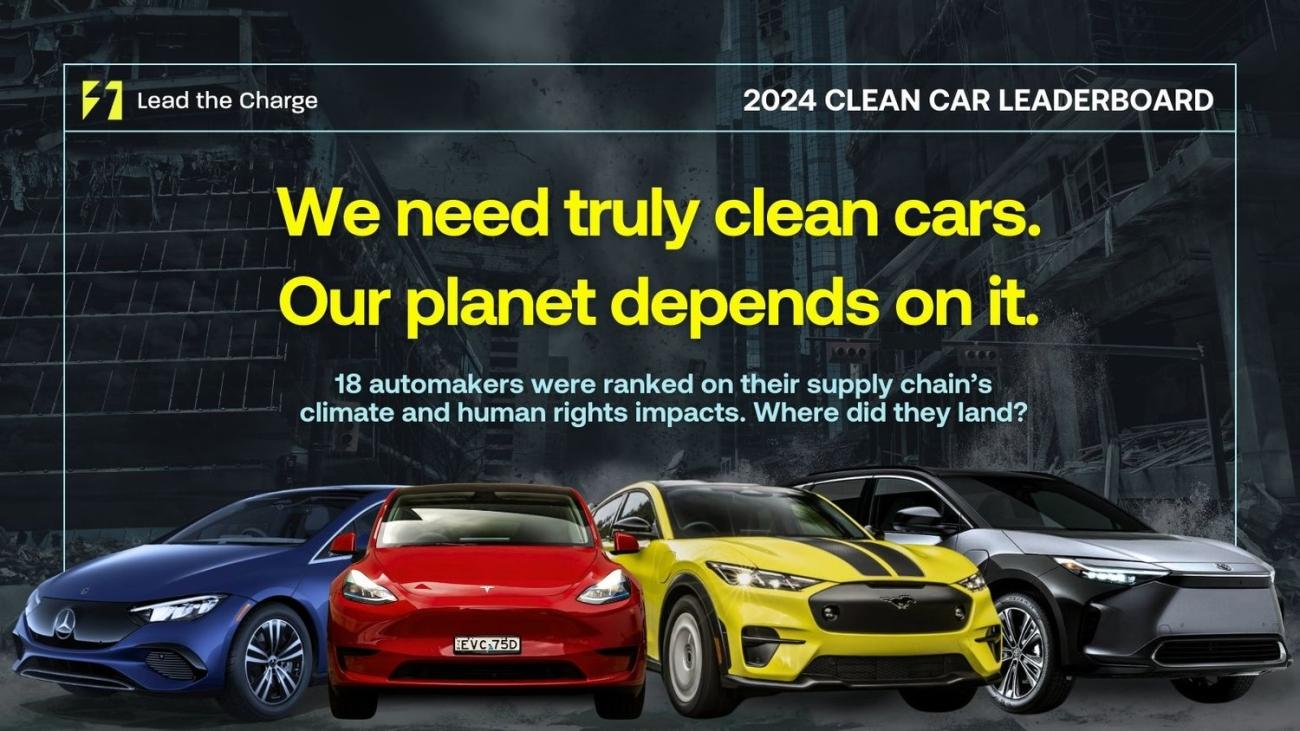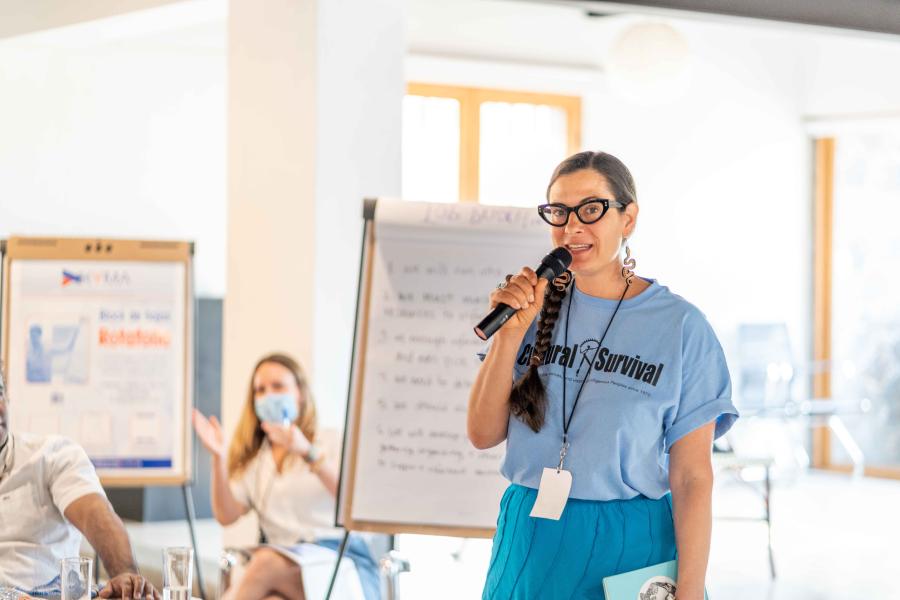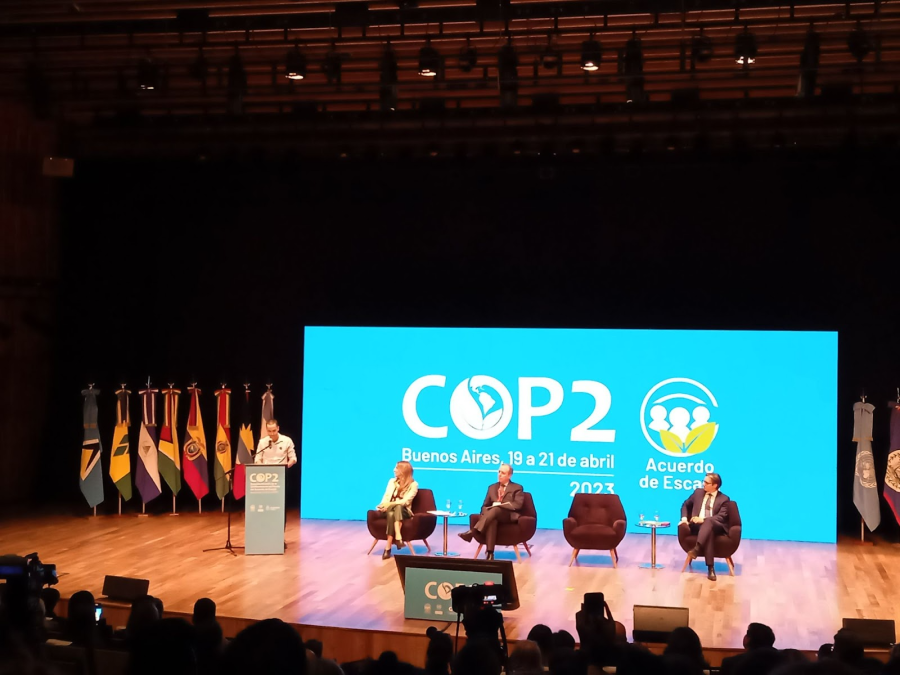
For Immediate Release:
February 28, 2024
Indigenous Peoples’ Rights “Must Be Prioritized” by the Automotive Industry Says Lead the Charge Campaign
Lack of Indigenous Rights Risk due diligence is still pervasive in the automotive industry reports the second edition of the Lead the Charge Leaderboard, which assessed 18 of the world’s leading automakers to evaluate their efforts “to eliminate emissions, environmental harms, and human rights violations from their supply chains.”
According to the report released on February 27, 2024, automakers are ignoring risks and potential harm to Indigenous Peoples in their supply chains and are failing to take action to scope for Indigenous Rights Risk and uphold the rights of Indigenous Peoples. The inability to scope for Indigenous Peoples’ rights is “clearly an issue that must be prioritized by the auto industry moving forward.”
Despite some industry improvements on human rights due diligence since Lead the Charge first published the leaderboard in 2023, Indigenous Peoples’ rights are still the lowest-scoring among 80 indicators, and where the industry has shown the least amount of improvement:
For the second year in a row, company progress remained abysmal in the Indigenous rights subsection: the average score was just 4%, an increase of 1 percentage point over the year. This means that this subsection continues to receive the lowest average score of all, but was also the issue where automakers made the least progress…
With 11 out of the 18 automakers continuing to score 0% on Indigenous Peoples’ rights and with 70% of automakers making no progress on Indigenous Peoples’ rights, the report demonstrates lack of adequate action by the industry to ensure a just transition across supply chains.
“It is imperative to recognize that any missteps in this transition could potentially inflict harm upon Indigenous Peoples, affecting their livelihoods, cultural connections to ancestral lands, and the biodiversity they have responsibly stewarded for centuries,” said Galina Angarova, Executive Director of Securing Indigenous Peoples' Rights in the Green Economy (SIRGE) Coalition upon launch of the leaderboard. "Recognition, respect, and upholding of Indigenous Peoples' right to self-determination, operationalized through the full implementation of Free, Prior and Informed Consent (FPIC), stands as the cornerstone for a truly just and equitable energy transition benefiting all.”
FPIC as the Cornerstone to Clean Car Supply Chain Risk Due Diligence
As demand for electric vehicles increases and with more than half of the minerals used in renewable energy technology located on or near Indigenous Peoples’ lands, activities across the auto supply chain must respect Indigenous Peoples’ right to self-determination and to FPIC.
Too often extraction projects linked to auto supply chains are conducted on Indigenous Peoples’ territories without FPIC and sometimes displacing them from ancestral lands, said the report. These projects pollute communities’ life-sustaining resources and violate Indigenous Peoples’ right to food, water, livelihoods, and culture.
“Upholding the principles of FPIC ensures that Indigenous communities actively participate in the decision-making processes that directly affect their lives and territories, and fosters a transition that respects their autonomy and well-being,” said Angarova.
The Leaderboard evaluated automakers’ FPIC due diligence on projects and activities on Indigenous Peoples’ lands and territories. The five highest ranking companies on were Tesla (26%), Mercedes (15%), GM (11%), BMW (8%), and Ford (7%).
Tesla was notable for its improved score, which rose from 5% to 26%. This occurred after an update to their FPIC requirement in their human rights policy, stating that: "For all raw material extraction and processing used in Tesla's products, we expect our suppliers to engage with legitimate representatives of indigenous communities and respect their right to grant or withhold free, prior, and informed consent for their operations." In addition, the automaker provided case studies on its assessment of Indigenous rights involving lithium development in Chile and Argentina and nickel development in Canada and Indonesia.
Mercedes requires suppliers to comply with FPIC in its Responsible Sourcing Standards, but does not reference the United Nations Declaration on the Rights of Indigenous Peoples (UNDRIP), which articulates minimum standards to uphold Indigenous Peoples’ rights. The company also identifies impacts to “community and indigenous rights” as a supply chain risk but does not specify FPIC.
BMW, Mercedes and General Motors (GM) were the only companies that made explicit commitments to the UNDRIP. GM made this commitment in both its overall human rights policy and its Supplier Code of Conduct, but has come under criticism for failing to respect FPIC via its investment in Lithium Americas’ Thacker Pass mine (see the SIRGE Coalition case study below). While Tesla, Mercedes, GM and BMW were the only automakers with explicit commitments to respect FPIC, none disclosed whether the commitments were translated into the languages of Indigenous Peoples impacted from their supply chains – a prerequisite for FPIC to be achieved.
Automakers must develop comprehensive processes to solicit and respect Indigenous Peoples' FPIC and transform their supply chains to ensure the rights of Indigenous Peoples, and all rights holders, are respected. Companies that have made some progress in human rights and Indigenous Rights Risk due diligence can leverage momentum to expressly identify and prevent violations of Indigenous Peoples’ rights in their supply chains. The energy transition and the transition to clean cars is an opportunity to change industry norms and provide a pathway for a more just and sustainable future for all.
Read SIRGE Coalition’s case study featured in the Lead the Charge report:
The Thacker Pass Mining Project: Free, Prior and Informed Consent and Indigenous Peoples’ Rights
General Motors announced in January 2023 that it will invest $650 million in Lithium Americas Corp. and will help the company develop its Thacker Pass lithium mining project, with the aim of ensuring a supply of lithium for its electric vehicles. However, the Thacker Pass project is proposed on Peehee Mu’huh, a sacred site on Paiute, Shoshone and Bannock lands in Northern Nevada. This landscape holds significant spiritual value to Paiute, Shoshone and Bannock peoples, in part, because this is the site of two massacres resulting in many ancestors’ bodies being buried in the land. The Reno Sparks Indian Colony, Berns Paiute Tribe, Summit Lake Paiute Tribe, and People of Red Mountain do not consent to the project and have filed lawsuits in opposition to the Thacker Pass mining site.
Peehee Mu’huh, which translates to “rotten moon”, is the site of two massacres which gave the sacred site its name. During the second massacre in September 1865, the U.S. government attempted to exterminate the region’s Indigenous Peoples, including children, by attacking a camp at the base of the pass. This attack was part of the broader pattern of federal policy to open up western lands for Euro-American settlers and to promote the growth of industries, including mining. Lithium Americas is able to propose a mine at Thacker Pass today because of this historical context of violence and dispossession of Indigenous lands.
Despite GM’s Human Rights Policy, which includes a commitment to the UN Declaration on the Rights of Indigenous Peoples and to Free, Prior, and Informed Consent (FPIC), it has not paused its investment to assess its Indigenous Rights risk, nor has it required Lithium Americas to assure that it has obtained consent in line with FPIC standards. This comes after the People of Red Mountain and Securing Indigenous Rights in the Green Economy (SIRGE) sent an open letter addressed to GM, calling for it to require Lithium Americas, and its other suppliers, to implement FPIC policies in accordance with UNDRIP, and to rescind its investment where its suppliers fail to do so.
People of Red Mountain, a group of traditional Paiute, Shoshone, and Bannock Peoples with ancestral ties to the area and allies have asked GM to meet and the company has not done so, nor even responded to the multiple requests.
About Lead the Charge
Lead the Charge is a diverse network of local, national, and global advocacy partners working for an equitable, sustainable, and fossil-free auto supply chain. Organizations that have contributed to its development include Industrious Labs, Investor Advocates for Social Justice, Mighty Earth, Public Citizen, Sierra Club, Solutions for our Climate (SFOC), Transport and Environment (T&E), The Sunrise Project, Cultural Survival, Earthworks, First Peoples Worldwide and others.
Earthworks, Cultural Survival, and First Peoples Worldwide are part of the Securing Indigenous Rights in the Green Economy (SIRGE) Coalition, a coalition of Indigenous Peoples and leaders, who, along with allies, champion a just transition to a low-carbon economy. As the global demand for the minerals necessary for renewable and green technologies continues to grow, SIRGE calls upon government, corporate, and financial decision-makers to avoid the mistakes of the past: avoid dirty mining and protect the rights and self-determination of Indigenous Peoples around the globe, many of whom live in areas rich in these minerals.
For more information about the campaign, visit Lead the Charge’s website, Twitter account and LinkedIn account.
###
Media Contact:
Noreen Quadir: noreen@sirgecoalition.org




